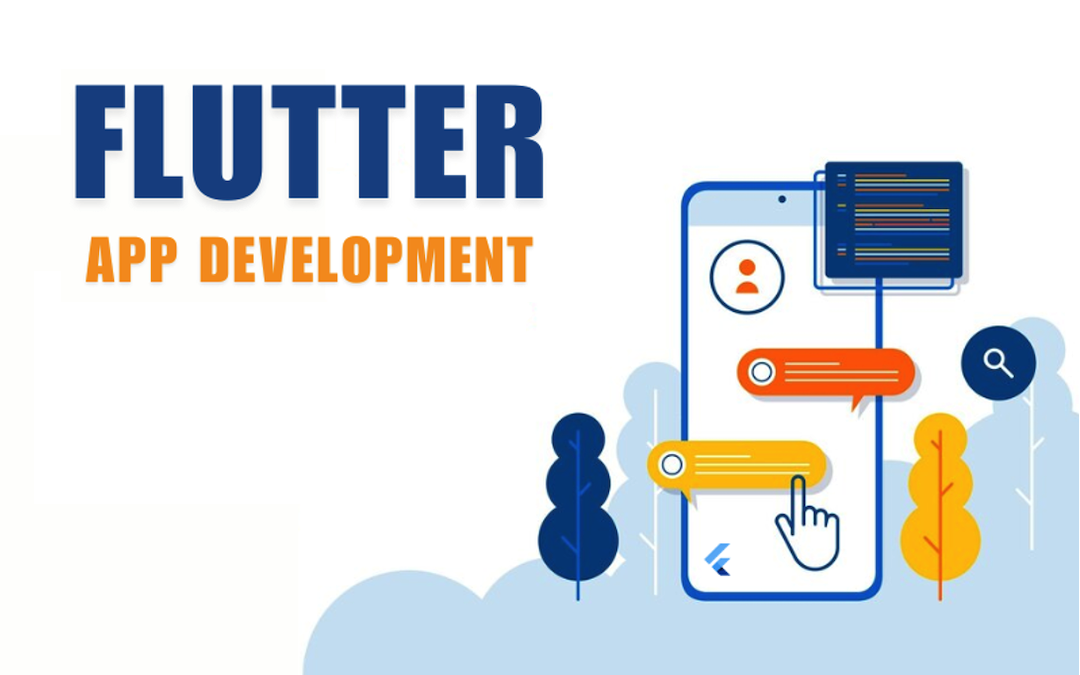
Choosing a framework or development kit is typically the first consideration when developing a mobile application that can run on many platforms. The Google Flutter app development framework is the most effective choice in this situation.
There are a lot of things to think about when choosing the technology on which to develop your app. However, the most crucial factors are cost and time.
Fortunately, partnering with a reputable Flutter app development company can provide a quick and efficient solution for your app development needs through the Flutter framework.
We'll explain why Flutter is a fantastic option for you and your business in this article. Prepare to discover how Flutter may help you save costs and save time without compromising quality.
Why is Flutter Framework mobile app development so popular?
Flutter app development has gained a lot of traction in the app development community for several reasons. App developers find Flutter appealing because of its cross-platform development capabilities, rapid development cycles, highly configurable user interface, excellent performance, and encouraging community. Over 400,000 Flutter applications were in use as of 2023.
React Native was eclipsed by Flutter in 2021 as the most popular cross-platform mobile framework. According to a poll, 42% of developers worldwide have embraced Flutter.
Roughly one-third of developers utilize cross-platform technologies or frameworks, even though most still prefer local tools. Consequently, it is evident that Flutter is becoming more and more popular, and this trend is predicted to continue in the years ahead. By 2023, the company's control over the sector should be even more apparent.
Some of the main factors contributing to the popularity of the flutter development framework are as follows:
Cross-platform development:
Rather than having to create two different apps, developers may save time and effort by using Flutter to create apps that function flawlessly on both the iOS and Android platforms.
Quick development:
Flutter has a feature called "hot reload" that allows developers to view changes they make to the app's code right away without having to start from zero while building it. Faster cycles for testing and development follow from this.
Gorgeous and adaptable UI:
Flutter has a large selection of widgets that can be easily customized, making it simple to design stunning, captivating, and handy user interfaces.
High-performance:
Dart, a quick and effective programming language that translates into native code for the iOS and Android platforms, is used to write Flutter apps. As a consequence, lag-free, high-performing apps are produced.
Increasing community:
Flutter has a rapidly growing developer community, providing access to a wide range of tools, tutorials, and online support.
10 Reasons Your Business Needs Flutter For App Development
Flutter provides developers with an extensible and strong framework to create cross-platform mobile apps of superior quality. Flutter is a popular choice for many mobile app development companies because of its cross-platform development features, quick development cycles, flexible user interface, excellent performance, and friendly community.
Why do entrepreneurs choose to use Flutter instead of other options when creating apps, and what are the possible results? Now, let's take a closer look at Flutter's benefits.
1. Perfect for Developing Cross-Platform Mobile Apps
The fact that cross-platform app development is more affordable and quicker than native development is one of the main reasons why companies choose it over other options. Cross-platform programs, however, used to run slower and didn't have the same native look as their native equivalents.
However, with the release of Flutter, it is now feasible to develop apps with performance close to native apps. As a consequence, businesses can now use Flutter to create apps without having to compromise on quality or cost.
2. Extraordinary Degree of Achievement
Because Dart is a client-optimized programming language that supports Ahead-of-Time (AOT) composition, Flutter apps can achieve remarkable performance outcomes of 60 to 120 frames per second. Because the code runs natively on each platform and doesn't require the intermediates that other cross-platform frameworks usually utilize, Flutter apps execute quickly. Because of this, Flutter performs better than competing frameworks and doesn't require bridging.
3. Outstanding Mobility as a result of using a single codebase.
Using a single codebase, developers may now create apps for six distinct platforms: Android, iOS, Web, Windows, macOS, and Linux, thanks to the introduction of Flutter 3. This was made possible in May 2022. This implies that developers must make minor code changes to construct and deploy their apps across these platforms.
As a result, this method saves developers time and money by allowing them to reach a larger audience without investing much money in developing different applications for each platform.
4. Reduce the Building Costs And Added Expenses
If you are a startup or an organization needing financially sustainable solutions on a framework, look no further than the Flutter app development solution. While a project's overall cost may change based on several variables, creating a Flutter app is typically 30%–40% less expensive than creating a native app. This is so that less time and effort are needed during the development process, as Flutter makes it possible to create apps for several platforms using a single codebase.
Furthermore, development time and expense are reduced by the availability of pre-made, reusable widgets and components. To summarize, Flutter is a wise option for businesses trying to cut costs without compromising functionality or quality.
5. The Hot Reload feature
With the help of the Flutter framework's hot reload capability, developers may view their code changes in the app right away without having to restart or rebuild it from scratch. This implies that developers may view the findings instantly, make real-time modifications to the app's code, and swiftly address any problems. One of the main advantages of utilizing the Flutter framework is this effective tool, which helps developers save a ton of time and effort throughout the development process.
6. Integrated UI Widgets
Developers may design visually stunning and responsive user interfaces using a variety of built-in UI widgets from Flutter. These widgets are readily incorporated into any Flutter project and are made to be very customizable. Pre-built widgets such as buttons, text fields, checkboxes, radio buttons, sliders, progress bars, and many more are often utilized.
Developers may concentrate more on creating the essential features of the app and save a lot of time and work by utilizing these pre-built UI widgets instead of starting from scratch when creating UI components. These widgets are perfect for creating cross-platform apps as they are performance-optimized and can adjust to various screen sizes and device orientations.
7. Making Original Designs
With the abundance of pre-built, customizable widgets and components that Flutter provides, developers and designers can create original mobile applications without limiting their imagination. Additionally, as was previously said, developers can create UI and UX for extremely native apps thanks to the integrated Material and Cupertino widgets.
As a result, Flutter apps with stunning, contemporary UIs that offer a flawless user experience may be made. These applications are renowned for their outstanding functionality and low chance of issues occurring.
8. Perfect for the Development of MVPs
For developing Minimum Viable Products (MVPs), the Flutter development framework is perfect for several reasons. To start, Flutter's hot reload functionality, pre-built UI components, and single codebase that can be modified for several platforms make it an efficient and affordable approach to creating apps.
Second, Dart, the streamlined programming language used by Flutter, permits Ahead-of-Time (AOT) compilation and provides exceptional performance. Third, Flutter makes it simpler to add features and functions to the MVP without having to invest a lot of time and energy in development because of its extensive library, plugins, and connectors with different APIs and SDKs.
9. Becoming Better Every Day
With the support of its expanding worldwide community, Flutter is improving every day. As more developers use the framework, they are making improvements to it by creating additional packages, widgets, and plugins that increase its capability. This implies that Flutter is always developing and becoming more capable.
Additionally, Flutter boasts a vibrant developer community that actively collaborates on new feature development, exchanges best practices and information, and supports the platform. In the end, this improves the framework as a whole by fostering a collaborative environment and allowing developers to learn from one another.
Furthermore, the Flutter creators, Google, constantly improve the framework's functionality, reliability, and performance. This implies that Flutter will continue to be improved, enhancing its standing as a top cross-platform development framework for developers.
Flutter Mobile App Development: What's in Store for the Future?
The cross-platform programming framework Flutter has been quite popular recently since it offers many benefits over native app development. Due to the framework's demonstrated effectiveness, adaptability, and affordability, a growing number of companies are using Flutter to create their mobile applications. Future growth in the demand for Flutter is anticipated. This is mostly due to the growing acceptance of cross-platform development. Flutter is the solution for many businesses trying to create apps more quickly and affordably.
Additionally, custom mobile app development services prefer Flutter due to its robust features like Hot Reload, pre-built UI widgets, and reactive programming architecture. These features simplify and optimize the development process, allowing developers to focus more on delivering high-quality products.
Conclusion
Flutter's vibrant and encouraging international community bodes well for the platform's future. Since the framework is an open-source project, developers are welcome to collaborate and contribute to its advancement. This focus on the community has allowed Flutter to expand quickly and change over time.
Related Posts
Share this post
Leave a comment
All comments are moderated. Spammy and bot submitted comments are deleted. Please submit the comments that are helpful to others, and we'll approve your comments. A comment that includes outbound link will only be approved if the content is relevant to the topic, and has some value to our readers.


Comments (0)
No comment